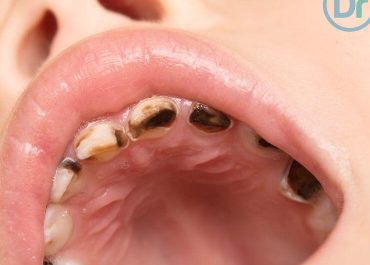What Are The Primary Teeth And When Do They Erupt?
After your baby is born, twenty primary teeth are ready to erupt in jaw. The first primary tooth erupts between 6 months to 12 months of the life. Since growth and development vary in each child, there is no need to worry when deciduous teeth erupt within the mean time.
There are twenty deciduous teeth. Deciduous teeth include incisors, canines and first molars similar to that of permanent teeth. Redness and itching may develop while the teeth are erupting especially when your baby is 6 to 18 month old. Fever and pain are likely and your baby may be restless. Dentists may recommend pain killers and some gels to cope with such problems of this period.
Eruption of deciduous teeth is completed at 3 years of age. Your child completes development period. Dental care and regular tooth brushing are important to avoid caries from this period to 6 years of age. It is important to attend dental visits at 6-month intervals to relieve anxiety of your child and to develop a good relation between your child and the dentist.
Primary teeth start to change at age 6 to 8 and fall out in order to be replaced by permanent teeth. The fall out and replacement continues until around age 12.
Primary teeth begin to swing and often fall out spontaneously as the root of the primary teeth are thinned by the incoming teeth. Sometimes, primary tooth does not get loose and fall out and the permanent tooth appears in the mouth in a different place. In this case, primary tooth must be extracted.
How To Extract Primary Teeth?
First dentist experience of children is very important. Fear of a dentist often originates from a body dentist experience in childhood. It would be more appropriate to extract primary teeth after the child is adapted to the procedure in 1 to 2 sessions. Anesthesia is a must to suppress pain while the tooth is extracted.
Children are particularly afraid of needles and anesthesia. We use digital anesthesia for children to facilitate extraction of teeth in children. With single-tooth anesthesia (STA), anesthetic agent is administered with a very small tip, just like a pen, without using a syringe, and thus, anxiety of the child is relieved and the tooth is extracted easily.
What Should We Do If The Primary Tooth Is Not Replaced By Permanent Tooth?
Primary teeth prepare an appropriate place for the eruption of the permanent teeth. Rarely, the permanent tooth that will erupt might have never formed due to familial genetic factors. Early radiological identification of congenital absence of permanent teeth prevents more challenging future orthodontic problems. If the primary tooth is not replaced by incoming tooth or the primary tooth is extracted early, the resultant space should be conserved with space maintainers until the appropriate age.
How To Detect Primary Tooth Decay?

The decay appears as a black spot on the chewing surface of the tooth. You can identify tooth decay by checking the surface of the teeth intermittently at home. Tooth ache is an another important sign. Moreover, you had better start dental visits after the child is 3 years old.
What Are The Treatment Options For Primary Teeth?
Treatment options for the primary teeth are similar to that of the permanent teeth. Filling, root canal treatment, pulp capping etc. Root canal treatment of the primary teeth should be performed carefully.
Why Are Primary Teeth Important?
Milk teeth are important, although they are not permanent. The milk teeth must be healthy for the child to be able to chew, eat, speak comfortably and look good. Primary teeth reserve a room for the permanent teeth to erupt. Primary tooth decay should be treated before they fall out. Early loss of primary teeth is important because it may cause some permanent teeth to become impacted.
Do Primary Teeth Fall Out At Age 5?
No. In normal circumstances, primary teeth start to fall out at age 6 to 8. It may very seldom start falling out at age 5.
Why Does The Baby Bottle Tooth Decay Occur?
Bottle tooth decay is a type of caries that affects multiple teeth on the upper and the lower jaw and seen on the surface of the anterior teeth. It occurs due to prolonged exposure of the teeth to a sugar-containing beverage. That’s why it is called baby bottle tooth decay. It will be right to keep your child away from beverages that contain sugar and limit the use of baby bottle.
Bottle nipple should be cleaned and should not be dipped into sugar, honey, etc.
Benefits Of Breast Milk For The Tooth Health
In a study published in the journal “Pediatrics” on June 2015, it was found that infants who were fed breast milk for 6 months had 72% fewer dentition defects.
- Breast milk also decreases the risk of baby bottle tooth decay.
- You do not need to stop breastfeeding, while teeth of your baby are erupting.
- For baby’s oral and dental health, the mother should also have a good dental health. Do not forget that decay is contagious.
When Should Dummy And Thumb Sucking Be Stopped?
Dummy is useful for the sleep pattern of your baby in the first two years of life. Babies require dummy due to sucking reflex. If a child older than 3 is still dependent to dummy or sucks her thumb, such habits start damaging the tooth system. They may cause permanent disorders in the teeth. It causes severe orthodontic problems to occur. Narrow upper jaw and spaces between anterior teeth are potential problems.
Therefore, dummy or thumb sucking should be abandoned not later than the age 4.
